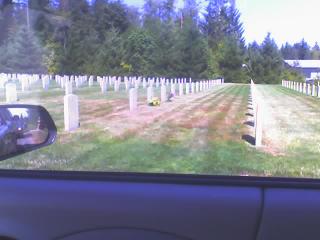Full Honors

Although never been there before, the church was easy to spot: The sidewalk in front of Renton Evangelical Presbyterian Church was lined with flag-waving men and women (both little flags and the big ones you have to balance off your hip). One flag bearer was an elderly man in full dress uniform (U.S. Army) and seated in a wheelchair. Lots of drivers honked as they passed. I, and three cars ahead of me, turned on our turn signals and pulled into its already-full parking lot. Lance Corporal Nicholas Bloem's memorial service would begin in 30 minutes.
The Apostle Paul pointed out to the believers in Corinth that the "message of the cross is foolishness" to those who don't get it (i.e., haven't met Christ), and this seemes most apparent to me at funerals. Certainly a funeral full of music and laughing and tears and sobs looks, well, unnatural. Yet that was the 2 1/2-hour service, which was full of singing, stories about Nick, more singing, and more stories, and more singing.
It was also a service in which Nick received full military honors. His flag-draped coffin was brought in by six Marines in full dress uniform; they slowly saluted him before sitting in the pews. (Just the sight of them made me sit straighter.)
Just before the end of the service, we were told that someone asked to sing for Nick's family. This man had recently lost a brother, and knew the pain felt by Nick's family firsthand. He'd learned about Nick when asked if he could send some sheet music for use at the service. But Nick's story touched him, and he felt God wanted him to come. So he left his home in Nashville, jumped on a plane, and came to the service to sing his song: "In Harm's Way," himself, said recording artist BeBe Winans as he stood before us. He hoped Nick's parents wouldn't mind if he personalized the song to their son a little. They didn't.
But that was just the service. After the six Marines slowly saluted one last time and returned Nick's coffin to the waiting hearse, we all filed out and went straight to our cars to join the procession to Tahoma National Cemetery in Kent. The half-mile long line of cars--emergency flashers blinking and headlines on--slowly traveled from the church to Nick's final resting place. Motorcycle officers blocked intersections for us, other cars pulled to the side of the road as we passed, pedestrians stood and watched the procession. It was as if all of us, even those who never knew this Marine, had stopped to pay their last respects.
Once we arrived at the cemetery, things moved very quickly. The pastor spoke a few more words, Nick's parents were given the flag that had draped the coffins, six Marines fired three loud volleys into the air, and we prayed. Finally, the pastor invited people back to the church for the reception, adding that the family would follow after spending a little more time, now alone with their son. As we turned to leave, I heard one of his sisters sobbing.


0 Comments:
Post a Comment
<< Home